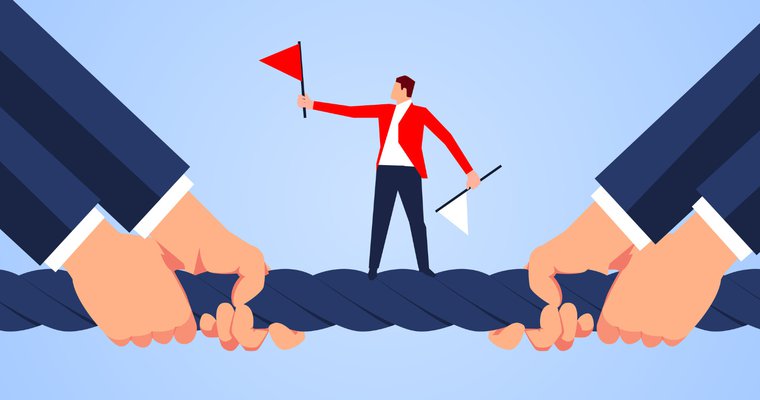When we make conflict worse than it needs to be
 iStock
iStock
 ChatGPT
ChatGPTToday, someone posted a snarky comment in response to an article I wrote. The comment was from someone I've never met. It bugged me. As I reflect back on it, I reacted physically: my muscles tightened and my blood pressure increased. Personally, I felt offended. I kept trying to think of clever, witty ways to respond. But, every immediate thought was differing versions of, "Well, here's some snark right back at ya!"
I found myself fighting a decades-old, internal impulse to jump into any available argument that presents itself. This impulse has never served me well; but, instead, has cost me much throughout the years. I've learned to catch these little flare-ups and move past them. (Most of the time!)
So, today's snarky comment brought a very minor conflict, barely worth mentioning; except for the fact that, not many years ago, I would have reacted unchecked. I would have jumped in with both feet and let the meaningless back-and-forth banter with someone else suck up an incredible amount of my time and emotional energy. And, at that point, the conflict would've no longer been minor. It would've been meaningful.
I can sometimes tend to make mountains out of molehills, to take a minor offense, or frustration, and respond in such a way as to escalate it. And, along the way, I rationalize my responses. In the confused logic of conflict, everything I'm doing makes perfect sense. I think to myself, "I'm looking for understanding, for fairness, for respect, for truth, for justice." And, I can honestly say, I've often gotten in my own way trying to obtain those things.
In all relationships, we don't have the ability to control others. Regardless of our level of responsibility in any particular conflict, the only responses and perspectives we can control are our own.
As leaders, the ability to use our experience and our responses as tools to defuse conflict and increase understanding is a critical skill.
There are three primary areas where we all tend to make things worse than they need to be:
AREA ONE – How I see myself:When I don't have a healthy self-image, I may frequently feel like I need to defend myself in conflict; or I may unnecessarily provoke others. If I don't have a healthy comfort with my strengths and weakness, or my sense of value and what I offer the world, I will experience difficulty responding proportionately.
When I don't have perspective or proportion in my responses I tend to under-react or over-react. I wait too long until issues become overgrown before I deal with them. Or, I blow up all the time because of my tendency to catastrophize.
If I believe others really are in control, and I'm a victim, I lose resilience and the ability to grow and learn from conflicts. Instead of seeing each conflict as an opportunity for personal growth, I throw my hands up and say, "Here we go again!" I tend to harbor grudges and resentments and keep secret scorecards of others' failings.
AREA TWO – How I see others:The way I tend to see and approach other people has a dramatic impact on how I experience conflict. If I tend to see other people as threats, or people who are only interested in themselves, or basically stupid, or basically untrustworthy, they will tend to live up (or down) to my expectations.
Becoming aware of how I tend to see others, and taking steps to shift that perspective, can go a long way to changing my overall experience with conflict.
AREA THREE – How I see the world around me:How I see the world around me has a dramatic impact on how I relate to conflict. If I'm a fatalist and don't believe I really have control over my choices, let alone my experiences, things will be either very threatening or I'll never really take on appropriate responsibility.
If I tend towards a "victim stance" (or, slightly expanded, what sociologists call a "conflict perspective") I view all of life as a conflict. Everything is "us versus them," "the haves and have nots." When I assume a "victim stance" I believe there is someone else out there, some power, some system, some thing that is working against me. Additionally, I then believe there is also someone else, some power, some system, some thing that is responsible (rather than me) for fixing this and rescuing me.
Lastly, I might tend towards believing I have lots of power. I might then believe I have an impact and really don't care what that impact is. In this case, I really don't value the world around me or take responsibility for the impact that I have. Any of these perspectives about the world around me create more or exaggerated conflicts.
Be the Change you Seek
If you'd like to experience conflict differently, along with different results, you must begin by changing yourself.
Christian Muntean is a seasoned expert in fostering business growth and profitability. With a Master's degree in Organizational Leadership and certifications as a Master Coach, Certified Exit Planning Advisor (CEPA), and International Mergers & Acquisitions Expert (IM&A), he guides entrepreneurial leaders through growth, succession planning, and exit strategies. He is an accomplished author of three books, including Train to Lead. Christian resides in Anchorage, Alaska, with his family. Learn More » |
More on Conflict & Criticism
- Unique problems grow you uniquely (by Richard Blackaby)
- They tried to quiet Charlie Kirk—but the gospel still speaks (by Bob Russell)
- The power of an unoffendable heart (by Tom Crenshaw)
- How did Jesus deal with animosity? (by Chris Bolinger)


